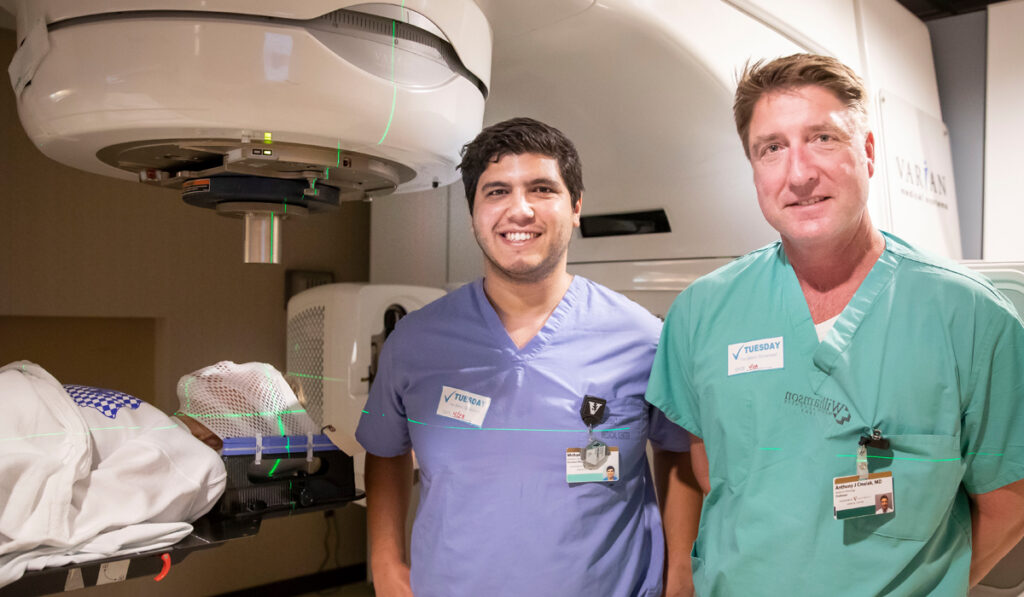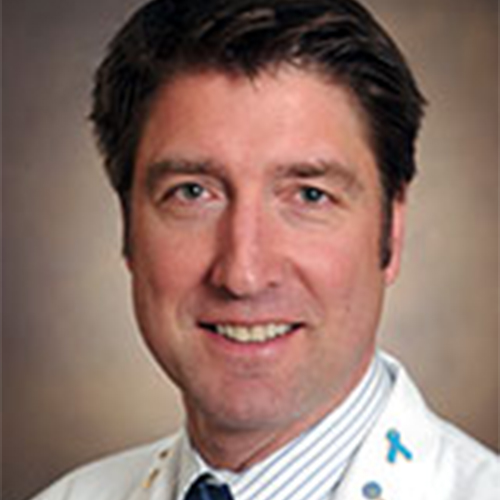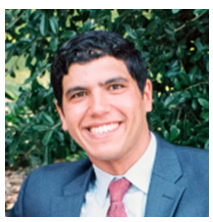A woman with lifelong major depressive disorder (MDD) and obsessive compulsive disorder (OCD) has finally found relief thanks to an innovative therapeutic approach conducted at Vanderbilt University Medical Center.
A multidisciplinary care team leveraged standard equipment in the radiation oncology laboratory at Vanderbilt-Ingram Cancer Center – a linear accelerator – to target the patient’s brain limbic system that controls MDD and OCD pathways. Four months after the procedure, the patient has discontinued several medications and has not required any electroconvulsive therapy (ECT), which she had previously been receiving twice weekly.
“What we’re doing is providing an incisionless treatment that can get patients off ECT and lifelong medications for OCD and get them back into society as a functioning person. With a one-to-two-day outpatient treatment, this is groundbreaking,” said Anthony Cmelak, M.D., a radiation oncologist at Vanderbilt participating in the effort.
“With a one-to-two-day outpatient treatment, this is groundbreaking.”
A Two-hour Treatment
Surgeons have long tinkered with limbic pathways to treat neuropsychiatric diseases, but a linear accelerator offers an alternative to cutting into the skull. It further circumvents the need for brain implants or pulse generators required for deep brain stimulation approaches, said Mohamed Khattab, M.D., a chief resident in the Department of Radiation Oncology at Vanderbilt-Ingram Cancer Center who has spearheaded the work at Vanderbilt.
“This procedure involves no pins or invasive immobilization and no risk of pins puncturing a vessel or the skull, potentially causing a fracture. It additionally does not require anesthesia and does not have the risks associated with surgery, where intracranial hemorrhage or infection are possible,” Khattab said.
Instead, a linear accelerator disrupts limbic circuitry with submillimeter accuracy using highly focused X-ray beams coming from multiple directions to each side of a patient’s head (which is immobilized using an Aquaplast mask). The procedure requires two hours of radiation over two days.
Symptom Improvement
Six weeks after her treatment, the patient reported a noticeable improvement in quality of life. Four months later, her OCD symptoms have been cut in half and depressive symptoms reduced by 30 percent, Cmelak said.
For many patients, OCD symptoms can be debilitating. Twenty percent of OCD patients do not respond to medications and only 60 percent seem to benefit from currently available deep brain stimulation treatments. The linear accelerator-based approach could provide another option for treatment-refractory patients.
Said Khattab, “We’re trying to bring this frameless radiosurgery to the forefront because that’s what patients are demanding – the least invasive treatment for their functional disease.”
Under the mentorship of Cmelak, Khattab has been awarded more than $430,000 in funding from Varian Medical Systems and Brainlab to treat patients using the procedure and to obtain advanced imaging that examines how circuitry and functionality of the brain changes over time after treatment. The research will help refine pertinent targets within the limbic pathways. The team has also received funding to see if the procedure can be used to treat other conditions.
“We are excited to expand the potential indications for radiosurgery not only for OCD, but for patients with refractory depression and even chronic pain,” Cmelak said.
An Accessible Option
Vanderbilt’s linear accelerator-based procedure is meant to be a one-time treatment with lifelong results. Because linear accelerators are commonly available within major health systems, the team hopes this treatment can quickly become widespread and easily accessible to patients. The procedure is also cost-effective for both patients and insurers.
“When we look at the cost burden to society and to health care systems, the burden of neuropsychiatric disease is staggeringly more than heart disease and all cancer care. As radiation oncologists who most commonly treat cancer patients, we find ourselves compelled to use our advanced technologies when possible to address other health care challenges,” Khattab said.
“We find ourselves compelled to use our advanced technologies when possible to address other health care challenges.”






